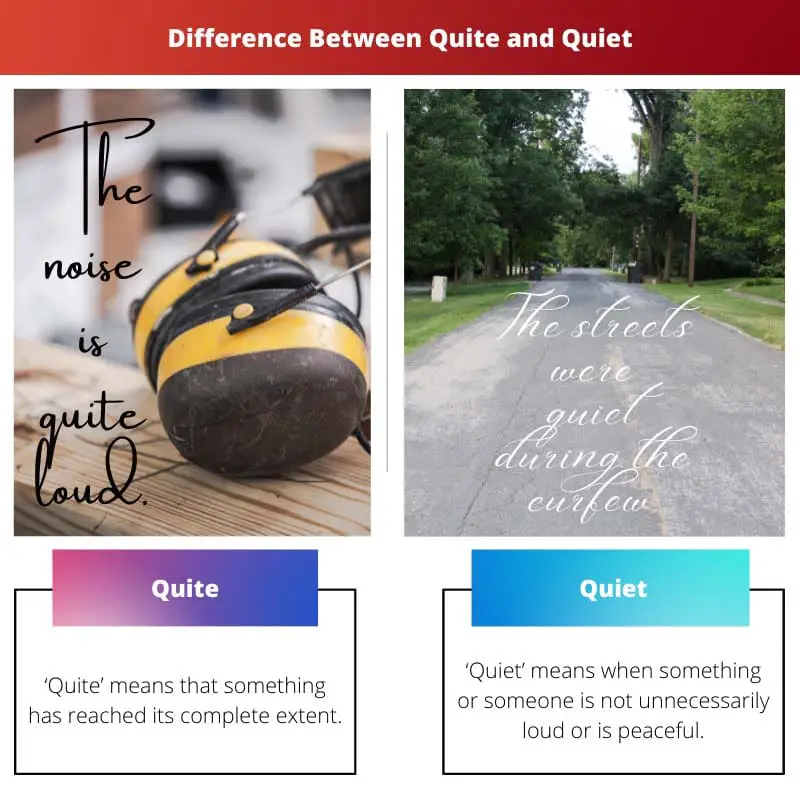It is believed that English is one of the trickiest languages that there is. The English language is rife with words that sound so similar that a person learning the language can easily get confused between them.
The more words you come across, the more confusion it creates. However, with patience and avid reading, the cloud of confusion can be lifted quite easily.
Two words that sound quite similar but have completely different meanings are ‘Quite’ and ‘Quiet.’
Key Takeaways
- ‘Quite’ is an adverb meaning ‘to a considerable extent or degree,’ while ‘quiet’ is an adjective meaning ‘making little or no noise.’
- ‘Quite’ emphasizes or modifies a statement, whereas ‘quiet’ describes the absence of sound or noise.
- In a sentence, ‘quite’ modifies another word, while ‘quiet’ describes a noun or pronoun.
Quite vs Quiet
Quite is an adverb that means to a certain extent, rather, or very. For example, “I am quite tired” means that the speaker is very tired. Quiet people may simply prefer to listen and observe rather than talk. Quiet is an adjective that means making little or no noise or calm and peaceful. For example, “The library is a quiet place to study” means that the library is calm and peaceful, with little noise.

‘Quite’ in its adverb form conveys the meaning that something has reached its entire extent. In its noun form is commonly used in bullfighting, where it means that a matador uses his cape to make passes to divert the attention of the bull.
The word first appeared in the texts of the 13th-century English language. Quite comes in handy to enhance the force of the word that follows it.
‘Quiet’, when used in its noun form, means there is no commotion.
It has the same meaning if used as an adjective along with additional meanings- it is used to portray that something is not very busy or is low in quantity or to describe a person who is reserved or not showy.
As a verb, it means to become or to make someone silent. This term has its roots embedded in Latin and Old French texts.
Comparison Table
| Parameters of Comparison | Quite | Quiet |
|---|---|---|
| Meaning | ‘Quite’ means that something has reached its complete extent | ‘Quiet’ means when something or someone is not unnecessarily loud or is peaceful, or to describe a person who is reserved |
| Parts of Speech | Adverb, Noun | Adjective, Noun, Verb, and Interjection |
| First Reference | In Latin | Texts of the Middle English language period |
| Usage | It is commonly used before a verb to enhance its intensity. | It is commonly used to describe a situation or a person. |
| Synonyms | Absolutely, Fully, etc. | Silent, Reserved, Peaceful, etc. |
What is Quite?
The term ‘quite’ can be used as an adverb to convey that something has reached its whole extent. For instance, “The noise is quite loud.” This means that the noise has reached its absolute limit.
The word was first used in English writings in the 14th century. In its adverbial form. It meant “completely or entirely.” In the mid-nineteenth century, the term was used as a weaker substitute for the word ‘fairly.’
In the 1300s, ‘quite’ was used as ‘quitely’ as an adverb- a term that is no longer in use now. In the 14th century, certain authors spelt ‘quite’ as ‘quight.’
In Modern English, ‘quite’ is used to indicate the intensity of the word that follows it. For example, “Ramya was quite clear about her stance on Marxism.” In this sentence, the usage of ‘quite’ depicts the extent of clarity of Ramya’s stance on Marxism.
‘Quite’ also has a noun form that means a matador during a bullfight uses his cape to make passes to deviate the attention of the bull.
The synonym of ‘quite’ is ‘absolute.’
What is Quiet?
The term ‘quiet,’ when used in its adjectival form, demonstrates that something or someone is free of noises or silent, respectively. For instance, “The streets were quiet during the curfew.”
‘Quite’ is used in this sentence to describe the streets that were devoid of any commotion. Another example is, “Solita is a quiet girl.” The usage of ‘quite’ in this scenario depicts that Solita talks less or is a reserved person.
In its verb form, ‘quiet’ means that someone or something is silent or tranquil or to make someone quiet. For instance, “You should quiet the baby, he is making a lot of noise.” In this sentence, ‘quiet’ is used as a verb to stop the baby from making noises.
As a noun, ‘quiet’ means the same tranquillity. “You need a bit of quiet before the match.” In this sentence, ‘quiet’ in its noun form means that the person needs a bit of quietness before the match to focus better.
“Quiet! You are disturbing the sleeping puppies.” In this sentence, the part of speech that ‘quiet’ represents is an interjection.
The synonym of ‘quiet’ is ‘silent.

Main Differences Between Quite and Quiet
- ‘Quite’ means that something has reached its maximum or absolute extent. On the other hand, ‘quiet’ means that something is devoid of noises or someone is silent.
- As a part of speech, ‘quite’ is a noun and an adverb. Whereas ‘quiet’ is used as an adjective, verb, noun, and interjection.
- ‘Quite’ has its roots in the texts of the Middle English language period. In contrast, ‘quiet’ was originally used in Latin texts.
- While ‘quite’ is used as an intensifier to indicate the absolute extent of something, ‘quiet’ is used to depict that something or someone is silent.
- The synonyms for ‘quite’ are ‘absolute’ and ‘thoroughly.’ In contrast, the synonyms of ‘quiet’ are ‘silent’ and ‘calm.’

- https://onlinelibrary.wiley.com/doi/abs/10.1002/jae.2374
- https://psycnet.apa.org/record/2009-09620-015

I appreciate the way you have described the difference between these two words. The explanation is quite clear.
This article is indeed informative. The detailed breakdown makes it easier to differentiate between the usage of ‘quite’ and ‘quiet’.
This article provides a comprehensive analysis. I find the historical context of ‘quite’ and ‘quiet’ to be quite intriguing.
The comparison table you have provided is really beneficial and makes it easier to grasp the differences. Great work!
I agree, Katie. That table presents a clear and concise overview of the distinctions.
The specific examples used to illustrate the usage of these words are really helpful. It provides clarity and understanding.
I agree, Twilliams. The examples used in the article truly help in understanding the applications of these words.
Absolutely, Twilliams. The practical examples make it easier to comprehend the nuances of language.
An excellent comparative analysis. The thorough explanation has definitely cleared any confusion I had about these words.
I found this article to be insightful and educational. It has greatly improved my understanding of these words.
I couldn’t agree more, Maisie. This article has effectively resolved any ambiguity regarding the usage of ‘quite’ and ‘quiet’.
This article is very insightful and well researched. I find it very interesting and useful.
I am glad to see that I am not the only one who finds etymology to be a fascinating topic.
I couldn’t agree more, Laura. This article is a great resource for those interested in language.
I am impressed by the historical background you have elaborated on. The origin of these words is rich in historical significance.
I agree, Eva. The historical evolution of language always makes for an interesting study.
The explanations provided were concise and articulate. It has enriched my understanding of these words.
Thank you for the perfect explanation. The spelling history of these words is fascinating.
I couldn’t agree more, Simpson. Knowledge of the etymology of words can provide a better understanding.